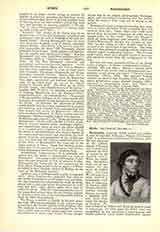

Kosciuszko, TADEUSZ, Polish patriot and soldier, b. near Novogrudok, Lithuania, Poland, February 12, 1752; d. at Solothurn, Switzerland, October 15, 1817. He was educated at the military schools of Warsaw and Versailles, and attained the rank of captain in the Polish army. When the American Revolution broke out he embarked for the scene of conflict and, joining Washington’s army, received a commission as officer of engineers, October 18, 1776. He served with distinction through the war, was made a brigadier general, and was voted the thanks of Congress. He then returned to Poland and lived for several years in retirement. In 1789, when the Polish army was reorganized, he was appointed a major-general and fought gallantly under Prince Poniatowski against the Russians. At the second partition of Poland, he resigned his commission and went to live in Leipzig. He headed the abortive revolution of Poland in 1794, and was wounded and captured by the Russians at the battle of Maciejowice, October 10. Imprisoned for two years, he was liberated by Emperor Paul on parole and with many marks of esteem. Thereafter his life was passed in retirement. In 1797 he revisited the United States, receiving everywhere great honor and distinction. Congress voted him a grant of land and an addition to his pension. On his return to Europe he took up his residence near Paris, spending his time in agricultural pursuits. In 1806 Napoleon wished him to join in the invasion of Poland, but he felt bound by his parole to Russia and refused. He went to live in Switzerland in 1816, making his home at Solothurn, where he was killed by a fall from a horse. His remains, by direction of the Emperor Alexander, were taken to Krakow, where they were interred with solemn pomp in the cathedral near the tombs of Poniatowski and Sobieski. A mound 150 feet high, made of earth taken from every battlefield in Poland, was piled up in his honor in the out skirts of the city.
THOMAS F. MEEHAN

